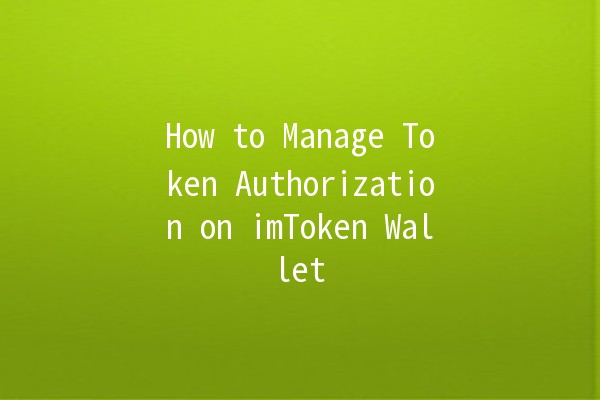In the rapidly evolving world of cryptocurrencies, managing your digital assets with utmost security is paramount. One of the widely used wallets is the imToken wallet, which provides robust functionality for managing multiple tokens and ensuring a smooth user experience. A critical aspect of these wallets is token authorization. Proper management can safeguard your assets, enhance your interaction with decentralized applications (dApps), and improve your overall crypto experience. This article delves into effective techniques for managing token authorization using imToken and provides actionable insights to improve productivity and security.
Before diving into specific techniques, it’s essential to understand what token authorization entails. Token authorization refers to the permission setup that allows applications to access your tokens. It is crucial for interacting with dApps, as they often require access to your tokens for transactions or other operations. Mismanagement can lead to loss of assets or unauthorized transactions. Thus, comprehensively overseeing your token authorization can significantly enhance your wallet’s security and functionality.
Each token you possess may have unique permissions associated with it, particularly when connecting to dApps. Understanding these permissions allows you to grant or deny access intelligently, ensuring you're not exposing your assets unnecessarily.

When you connect your imToken wallet to a new dApp, take the time to read the permission requests carefully. For instance, if a dApp requests permission to spend an excessive amount of a particular token, reconsider granting it until you can verify the dApp's legitimacy. Use forums and community channels to assess the trustworthiness of applications, ensuring you protect your assets.
Over time, you may authorize numerous tokens or dApps. Regularly reviewing these authorizations can help identify any that may no longer be necessary or pose security risks.
Every month, log into your imToken wallet and navigate to the "Settings" section to review authorized tokens. Effective management involves revoking access for tokens you haven't used or dApps not currently in your workflow. This practice minimizes exposure to potential hacks and unauthorized transactions.
Setting spending limits on token authorization can enhance control over how much any given dApp can access. This can be an effective strategy for mitigating potential losses.
When authorizing a dApp for token use, specify a reasonable spending limit. For example, if you’re using a lending platform, authorize only the amount you intend to lend instead of the entire balance. Should the dApp behave unexpectedly, this method helps ensure that your other tokens remain secure.
Smart contracts determine how token transactions occur on the blockchain. Familiarizing yourself with how they operate can provide insight into potential vulnerabilities during authorization.
Take time to learn about the common terms and functions in smart contracts used by your frequently used dApps. Websites like ETH Gas Station and Etherscan can provide transaction details, which may help you identify suspicious activity. For deeper learning, consider taking an introductory course on smart contracts specific to cryptocurrency applications.
For highvalue tokens or when conducting significant transactions, utilizing a multisignature wallet (multisig wallet) is wise. This type of wallet requires multiple keys to authorize a transaction, adding an extra layer of security.
Set up a multisig wallet for your imToken highvalue tokens. Designate trusted friends or advisors who will hold the additional keys. This method not only secures your tokens better but also allows for collaborative management of your digital assets, reducing the risks associated with singleuser control.
Managing token authorization effectively on the imToken wallet is essential for enhancing your security while engaging with the decentralized finance (DeFi) ecosystem. By understanding token permissions, regularly reviewing authorizations, utilizing token limitations, educating yourself on smart contracts, and employing multisig wallets, you can significantly mitigate risks and streamline your crypto experience. Remember, the key to successful asset management lies in proactive oversight and continuous education in the rapidly changing world of cryptocurrencies.
Token authorization is the permission granted to applications or dApps to access and manage your cryptocurrency tokens held in wallets like imToken. Proper management is crucial to ensure the security of your assets.
To view your authorized dApps, navigate to your wallet settings. There, you will find an option to view connected applications and the tokens they have permission to access. Regularly reviewing this section is essential for maintaining account security.
While many dApps are reputable, the safety of authorizing them depends on proper due diligence. Always research the dApp, read user reviews, and ensure it is widely accepted within the crypto community before granting access.
Yes, you can revoke token authorization at any time through the settings section of your imToken wallet. It’s advisable to revoke access for dApps you no longer use or trust.
If you suspect unauthorized access, immediately revoke permissions on your imToken wallet for dApps associated with that activity. Change your wallet’s security settings, such as your password and recovery phrases, and consider transferring your tokens to a new wallet.
It’s recommended to review your authorized dApps and tokens monthly. This practice helps you keep track of any unnecessary permissions and protects you from potential security breaches from outdated or unnecessary authorizations.
By incorporating these practices, you create a safer and more efficient cryptocurrency management experience, allowing you to focus on growth and innovation within your crypto portfolio.